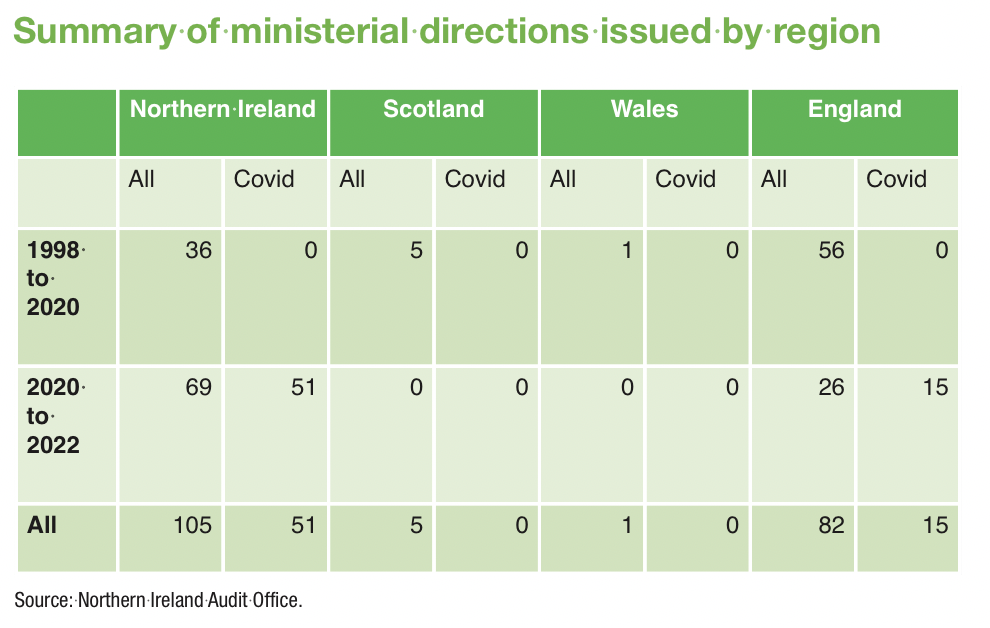Ministerial directions: A democratic deficit

Since the onset of the Covid-19 pandemic, 69 ministerial directions have been issued in Northern Ireland, more than have been issued in England, Scotland, and Wales combined.
Ministerial directions allow the minister of a department to set orders to civil servants without a vote in the Assembly. In the initial stages of the Covid-19 pandemic, when the Assembly could not meet in person, ministerial directions were utilised to bypass the need for the Assembly to meet and vote in person.
Although the majority of ministerial directions between 2020 and 2022 relate to Covid-19, ministerial directions have also been issued for non-Covid purposes at a rate much higher than England, Scotland, and Wales.
Ministerial directions are scrutinised by the Public Accounts Committee, which can make minor changes to the direction, but cannot reverse it wholesale. The only way a ministerial direction can be stopped is if it is not approved by either the First Minister, deputy First Minister, or the Minister for Finance. Fourteen ministerial directions have been issued since the resignation of Paul Givan MLA as First Minister on 4 February 2022.
If a ministerial direction proceeds without approval from one of the aforementioned, any expenditure associated with it would be deemed as irregular expenditure and reported in its financial accounts.
Northern Ireland: An outlier
A report by the Northern Ireland Audit Office outlines how, since 1998, a total of 105 ministerial directions have been issued in Northern Ireland, 69 of which were issued since 1 April 2020. The primary reason behind the significant, according increase since April 2020 was the spending proposals developed in response to the Covid-19 pandemic.
However, in the same period there has also been an increase in the frequency of non-Covid-19-related directions, including a number arising due to the absence of an agreed budget for the 2022/23 financial year.
Furthermore, although the report rationalises the Covid pandemic as being a key driver of the higher use of ministerial directions in Northern Ireland, there were still 36 issued in Northern Ireland pre-Covid, compared to five in Scotland, one in Wales, and 56 in England.
For context, since 1998, the Welsh Government has issued one ministerial direction and the Scottish Government has issued five. In the same period, a total of 82 ministerial directions were issued in Westminster. Of these, 15 related to Covid-19 spending proposals and five related to the UK’s exit from the EU. Therefore, the use of ministerial directions in Northern Ireland has been significantly more prevalent than in any other part of the UK.
Since the collapse of the Executive on 3 February 2022, ministerial directions were continued in widespread use until the formal collapse of the Assembly in October 2022.
Of the 69 ministerial directions issued up to 31 March 2022, seven were issued after the collapse of the Executive, meaning that these ministerial directions did not face any formal scrutiny, since the Public Accounts Committee was not functional. agendaNi understands that these ministerial directions will face scrutiny from the Public Accounts Committee upon the reformation of an Executive.
In addition, a further seven ministerial directions were issued between 1 April 2022 and 28 October 2022. In the absence of a sitting Assembly, the most recent 14 ministerial directions have yet to be scrutinised by a PAC.
Eight of the 14 most recent ministerial directions not yet scrutinised by the Public Accounts Committee included affordability as a reason for seeking them. This was in a period where there was no Executive, no formal budget approval for 2022/23, no monitoring rounds, and no means of seeking additional in-year funding.
Following Givan’s resignation as First Minister, 14 ministerial directions were issued by Executive departments, only one of which pertained to Covid; a £1.3 million funding increase for the Covid-19 Recovery Employment and Skills Initiative, issued by the Department for Communities.
Other directions issued by departments include £2 million for the pig support scheme, issued by the Department of Agriculture, Environment and Rural Affairs, £1.7 million for the establishment of a child funeral fund, and £3 million in funding to Derry City and Strabane Council to fund the City of Derry Airport, issued by the Department for Infrastructure.
Four of the 14 ministerial directions issued since Givan’s resignation were not approved, including two for a proposed level of funding in the region of £361 million for the Department of Health, with the Accounting Officer raising concerns of affordability.
Report recommendations
The Northern Ireland Audit Office makes three recommendations to increase the scope for scrutiny of ministerial directions:
Recommendation 1: Given the importance of MPMNI as a key administrative document for senior civil servants, the Department of Finance should publish an updated version as a matter of urgency, ensure that it remains up-to-date and review it on an annual basis.
Recommendation 2: The Department of Finance should remind all departments of their responsibility to notify the C&AG of any ministerial directions within the four-week timeframe and to include all relevant supporting documentation with the notification.
Recommendation 3: The Treasury Officer of Accounts should consult with the Permanent Secretaries Group to determine why the use of ministerial directions in Northern Ireland is significantly more prevalent when compared to other UK regions.






